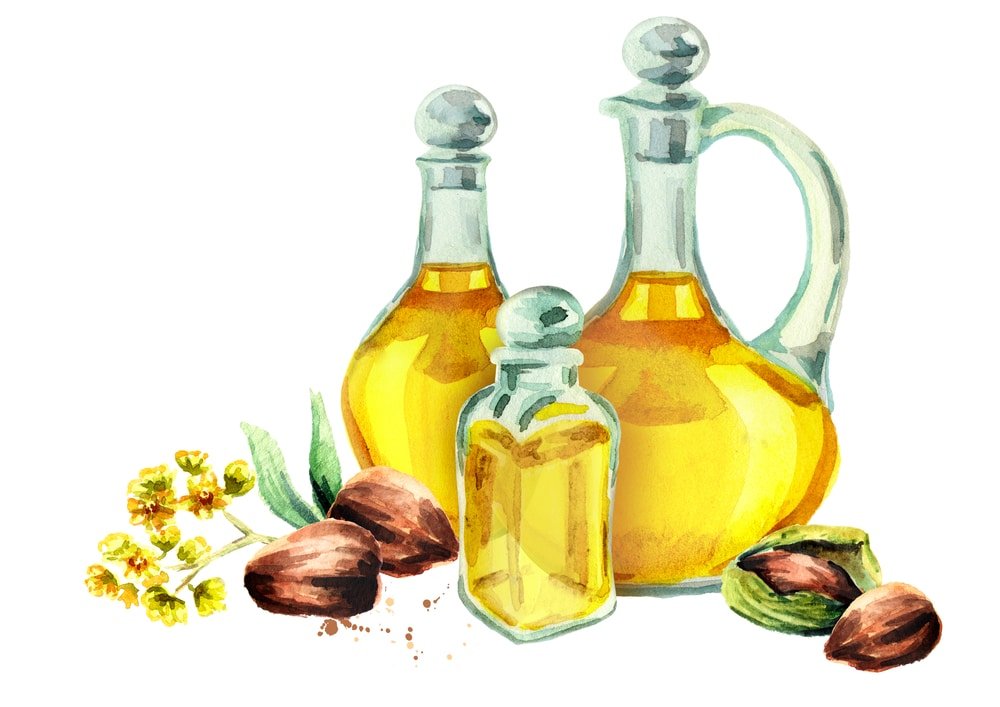Jojoba oil (Simmondsia chinensis) is a golden liquid extracted from the seeds of the jojoba plant, native to North America. Unlike other oils, jojoba is technically a liquid wax that closely resembles the natural sebum produced by the human scalp. This unique property makes it an excellent natural ingredient for hair care.
For years, jojoba oil has been used to moisturize the skin, treat dry scalp, and add shine to hair. But more recently, it’s gained popularity for its potential role in promoting hair growth. Its combination of vitamins, minerals, and fatty acids nourishes hair follicles, improves scalp health, and may help reduce hair loss.
In this article, we’ll explore the benefits of jojoba oil for hair growth, how it works, and the best ways to use it for healthier, stronger hair.
Understanding Hair Growth and Common Issues

Before diving into how jojoba oil helps with hair growth, it’s essential to understand the hair growth cycle and the common causes of hair loss.
The Hair Growth Cycle
Hair grows in three main phases:
- Anagen (Growth Phase): This is the active phase where hair grows about 1 cm per month, lasting anywhere from 2 to 7 years.
- Catagen (Transitional Phase): A short phase lasting 2–3 weeks where hair growth slows, and the hair follicle begins to shrink.
- Telogen (Resting Phase): Hair stops growing and eventually falls out, making room for new growth. This phase lasts around 3 months.
Disruptions in this cycle can lead to thinning hair, hair shedding, or even bald patches.
Common Hair Growth Issues
- Androgenetic Alopecia (Pattern Baldness): A genetic condition where hair follicles shrink over time due to sensitivity to the hormone DHT (dihydrotestosterone).
- Telogen Effluvium: Hair loss triggered by stress, illness, hormonal changes, or nutrient deficiencies, causing hair to prematurely enter the resting phase.
- Alopecia Areata: An autoimmune condition where the immune system attacks hair follicles, leading to patchy hair loss.
Addressing these issues often requires improving scalp health, ensuring proper nutrition, and supporting the natural hair growth cycle—all areas where jojoba oil can make a difference.
Nutritional Profile of Jojoba Oil
Jojoba oil is packed with bioactive compounds that support both scalp health and hair growth.



Key Active Components in Jojoba Oil:
- Vitamins:
- Vitamin B Complex: Promotes healthy hair growth by supporting the metabolic processes within hair follicles.
- Vitamin C: Acts as an antioxidant, protecting hair follicles from damage caused by oxidative stress.
- Vitamin E: A powerful antioxidant that improves scalp circulation and promotes hair growth.
- Minerals:
- Zinc: Essential for healthy hair follicle function, helping to prevent hair thinning and shedding.
- Copper: Plays a role in maintaining hair pigmentation and strengthening hair strands.
- Fatty Acids:
- Eicosenoic Acid, Oleic Acid, Erucic Acid: These fatty acids help to moisturize the scalp, improve skin barrier function, and promote soft, manageable hair.
- Antioxidants:
- Squalene and Tocopherols: Provide protection against environmental damage, reduce inflammation, and support overall scalp health.
This nutrient-rich profile makes jojoba oil a versatile, natural remedy for promoting stronger, healthier hair.
Mechanisms of Jojoba Oil in Promoting Hair Growth
Jojoba oil supports hair growth through several key mechanisms, targeting both the scalp and the hair follicles.
1. Moisturizing Properties
Jojoba oil is an excellent natural moisturizer. Its structure closely mimics the scalp’s natural oils (sebum), allowing it to penetrate the skin easily without leaving a greasy residue. This helps to:
- Hydrate both the scalp and hair strands, preventing dryness and brittleness.
- Reduce scalp flakiness and dandruff, common issues that can hinder hair growth.
- Maintain the moisture balance, improving hair texture and reducing breakage.
2. Sebum Regulation
While too little sebum can lead to a dry, itchy scalp, excess sebum can clog hair follicles, contributing to hair loss. Jojoba oil helps to regulate sebum production, keeping the scalp balanced and preventing blocked follicles that can stunt hair growth.
3. Antimicrobial and Anti-Inflammatory Effects
Jojoba oil has antimicrobial properties that help fight bacteria and fungi, reducing the risk of scalp infections like folliculitis and dandruff. Its anti-inflammatory compounds also soothe scalp irritation, creating an ideal environment for healthy hair growth.
4. Nourishment of Hair Follicles
The vitamins, minerals, and antioxidants in jojoba oil nourish the hair follicles, strengthening the hair from the root. This not only promotes new hair growth but also improves the thickness and quality of existing hair.
Scientific Evidence Supporting Jojoba Oil for Hair Growth
While jojoba oil has been used traditionally for hair health, scientific studies also support its benefits.
1. Scalp Health Improvement
A study published in Journal of Ethnopharmacology highlighted jojoba oil’s ability to improve scalp conditions like seborrheic dermatitis, a common cause of hair thinning. Healthy scalp conditions are critical for sustaining consistent hair growth.
2. Antioxidant Protection
Jojoba oil’s antioxidant properties help protect hair follicles from oxidative stress, which can damage cells and impede hair growth. This is particularly important in environments with pollution or exposure to UV radiation.
3. Anecdotal Evidence
Many people report noticeable improvements in hair texture, shine, and reduced hair fall after regular jojoba oil use. While more clinical trials are needed, the widespread positive experiences highlight its effectiveness.
How to Use Jojoba Oil for Hair Growth
Jojoba oil is versatile and easy to incorporate into your hair care routine.
1. Direct Application (Scalp Massage)
- Step 1: Pour a few drops of jojoba oil into your palm.
- Step 2: Warm the oil slightly by rubbing your hands together.
- Step 3: Massage the oil directly into your scalp using circular motions for 5–10 minutes.
- Step 4: Leave it on for at least 30 minutes or overnight for deep conditioning, then rinse with a mild shampoo.
2. Jojoba Oil Hair Masks
For added nourishment, combine jojoba oil with other natural ingredients:
- Jojoba Oil + Honey: Moisturizes dry hair and reduces scalp flakiness.
- Jojoba Oil + Coconut Oil: Deeply hydrates and strengthens brittle hair.
- Jojoba Oil + Essential Oils (like rosemary or peppermint): Boosts hair growth stimulation.
Apply the mask once a week for best results.
3. Adding Jojoba Oil to Hair Products
- Add a few drops of jojoba oil to your regular shampoo or conditioner to enhance its moisturizing effects.
- Look for commercial hair products that list jojoba oil as a key ingredient.
Recommended Frequency:
- Use jojoba oil 2–3 times per week consistently to see noticeable improvements in hair growth and scalp health.
Potential Side Effects and Precautions
While jojoba oil is generally safe for most people, it’s important to be aware of potential side effects.
Possible Side Effects:
- Allergic Reactions: Rare, but can cause redness, itching, or rash in sensitive individuals.
- Scalp Sensitivity: In rare cases, jojoba oil may cause slight irritation if used excessively.
Precautions:
- Patch Test: Apply a small amount to your inner forearm before full scalp application to check for allergic reactions.
- Dilution: While jojoba oil can be used undiluted, sensitive skin types may prefer mixing it with other oils.
- Consult a Dermatologist: If you have scalp conditions like psoriasis or eczema, consult with a healthcare professional before use.
Alternative Natural Remedies for Hair Growth
If you’re looking for other natural ways to promote hair growth, here are some effective alternatives to jojoba oil:
1. Rosemary Oil
- Benefits: Stimulates blood circulation to the scalp, promoting hair growth.
- Application: Dilute with a carrier oil and massage into the scalp.
2. Peppermint Oil
- Benefits: Provides a cooling effect, improving scalp health and encouraging hair growth.
- Application: Mix with jojoba oil for enhanced effects.
3. Coconut Oil
- Benefits: Reduces protein loss in hair, strengthens strands, and prevents breakage.
- Application: Use as a pre-shampoo treatment or deep conditioner.
Each remedy offers unique benefits, but jojoba oil stands out for its ability to mimic natural sebum, making it highly compatible with the scalp’s natural oils.
Conclusion
Jojoba oil is a powerful natural remedy for promoting hair growth, reducing hair loss, and improving scalp health. Its unique composition of vitamins, minerals, and fatty acids makes it highly effective for:
- ✔ Moisturizing the scalp and hair
- ✔ Balancing sebum production
- ✔ Reducing dandruff and scalp inflammation
- ✔ Strengthening hair follicles to promote growth
Tips for Best Results:
- Use jojoba oil 2–3 times a week consistently.
- Combine with natural ingredients like honey, coconut oil, or essential oils for added benefits.
- Always perform a patch test before full application.
While jojoba oil offers many benefits, remember that patience and consistency are key to seeing long-term results. For severe hair loss or underlying scalp conditions, consult a healthcare provider to rule out any medical issues.



Join the 7‑Day “Better Gut” Plan
Pop in your email and we’ll send Lesson 1 + the printable list.







